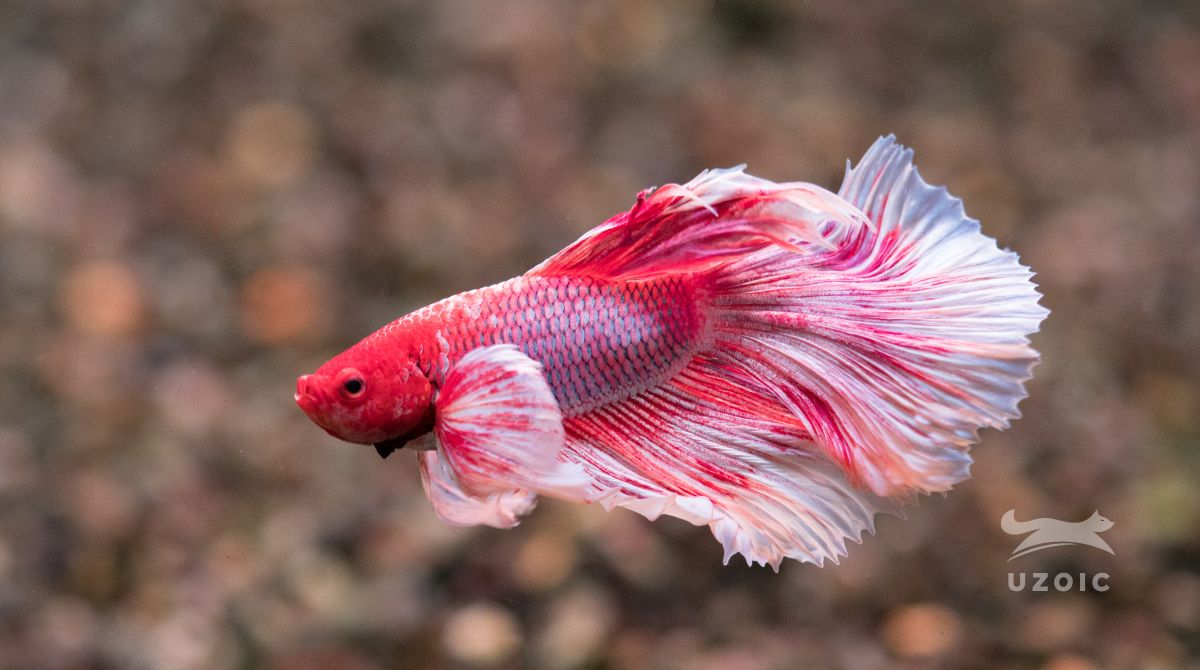If you have ever noticed that your Betta Fish fins are stuck together, don’t worry, you are not alone. This is a common problem among Betta owners and there are several reasons why it might happen.
In this blog post, we will discuss the various reasons why Betta fins might stick together and how to fix the problem. We will also provide some tips on keeping your Betta’s fins healthy and free from infection.
One of the most common reasons why Betta fins become stuck together is due to a condition known as fin rot. A bacterial infection causes fin rot and it can cause the fins to become brittle and break off.
If you notice that your Betta’s fins are starting to look ragged or breaking off, it’s important to immediately take action. The best way to treat fin rot is with a Betta-specific antibiotic, which you can purchase at your local pet store.
Another reason why Betta fins might become stuck together is due to poor water quality. If the water in your fish tank is not clean and well-maintained, it can cause the Betta’s fins to become irritated and inflamed. This can lead to the fins sticking together and eventually falling off.
To prevent this from happening, it’s important to keep your Betta’s tank clean and free of debris. You should also make sure that you are performing regular water changes and using a high-quality filter.
Finally, Betta fins can become stuck together if they are not properly conditioned.
If you don’t provide your Betta with a healthy diet and proper care, the fins can become weak and unhealthy. This can cause them to stick together and eventually fall off.
To prevent this from happening, it’s important to feed your Betta a high-quality diet and provide them with plenty of clean, fresh water.
If you notice that your Betta’s fins are stuck together, don’t panic. Identify the root cause of the problem and take it from there.
Table of Contents
Common reasons why your betta fish fins are stuck together:
Ammonia And Nitrite Water Levels
One of the first things that you should do if you notice that your Betta’s fins are stuck together is to check the ammonia and nitrite levels in your water.
Ammonia and nitrite levels that are too high can damage the delicate fins, causing them to stick together.
If these levels are high, it can cause the Betta’s fins to become irritated and inflamed.
You can check the ammonia and nitrate levels using a tool like the API Water Test Kit or any alternative tool that accurately displays the levels.
To fix this problem, you will need to perform a water change and add a Betta-specific ammonia remover such as Betta Basics to your tank.
Clean The Betta’s Tank
Another thing that you can do to fix the problem is to clean the Betta’s tank.
If the water in the tank is not clean, it can cause the Betta’s fins to become stuck together.
To prevent this from happening, you should perform a water change and make sure that you are using a high-quality filter.
Add Betta Conditioner To The Water
If the problem persists, you may need to add Betta conditioner to the water.
Betta conditioner will help to strengthen the Betta’s fins and prevent them from becoming stuck together.
You can purchase Betta conditioner at your local pet store or buy a popular one such as SeaChem Safe Water Conditioner online.
Clamped Fins
One of the most common reasons for Betta clamped fins is stress. Bettas are very sensitive to their surroundings, and even small changes can cause them to become stressed.
Common causes of stress include poor water quality, insufficient food, and lack of hiding places.
In addition, bettas are often stressed by the presence of other fish, even if they are not aggressive.
If your Betta’s fins are clamped, it is important to try to identify the source of the stress and remove it if possible.
In addition, you can use several medications to help reduce stress in bettas.
One of the most popular is StressGuard, which contains a calming agent, detoxifier, and ammonia reducer.
By reducing stress, you can often help to resolve clamped fins.
Fin Melt (Fin Rot)
Fin melt is a serious health issue that can cause the Betta’s fins to become stuck together. It affects many betta fish.
This condition results from poor water quality and can deteriorate the Betta’s long, colorful fins.
Other potential causes of fin melt include stress, infection, injury, or exposure to harsh chemicals.
If you notice that your Betta’s fins are starting to change color or recede in size, it is important to take immediate action by performing a water change and upgrading your tank.
Fin melt is caused by a gram-negative bacteria infection, and it can often be resolved with antibiotics. If you notice that your Betta’s fins are melting, it is important to take him to the vet as soon as possible. You may also try treating the fin rot using Bettafix.
In addition, you should remove any plants or decorations from the tank, as these can often harbor bacteria.
Further, bacteria can enter the fish’s body through open wounds or damaged fins.
If you notice that your Betta’s fins are starting to look ragged or they are breaking off, it’s important to take action immediately.
Also, many Betta’s already have some degree of bacterial infection when they arrive at your door step due to their previous living conditions.
The breeder may not have changed water frequently, which is a common problem observed in many Betta’s purchased online.
So lookout for signs of infections near the fins as soon as you get your new fish.
Conclusion
To summarize, there are a few reasons your betta fish fins might be stuck together.
- Poor water quality
- Ammonia and nitrite levels that are too high can damage the delicate fins, causing them to stick together.
- Infections or parasites
- If your Betta’s fins are sticking together and there are also signs of white spots or redness, they may be dealing with an infection.
The best way to determine the cause of your Betta’s fin problems is to take a sample of their water to a local pet store or aquarium for testing.
Once you know the problem, you can take steps to correct it and help your betta fish live a long and healthy life.
You may like:
- Is Duct Tape Safe For Fish Tanks And Aquariums?
- How Long Can Betta Fish Go Without Food?
- The Best Aquarium Glue for Rocks! How to Safely Bond Your Fish Tank Decor
- How often do I feed my Betta fish


